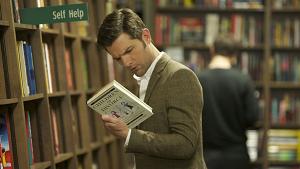 In comedy, timing is everything; timing can mean the difference between an audience erupting in belly laughs or awkward chuckles because they’re too polite to stay quiet. So when we sift through the individual pieces that constitute A.C.O.D.‘s whole, the element of timing emerges as chief among them. You need good timing to make bland jokes work, and without a good cast, there’s no good timing. How first time director Stu Zicherman managed to assemble his immensely talented group of actors and actresses- which starts with Adam Scott and ends with Jane Lynch – is a wacky mystery, but bully for him for finding the right people to make his material pop.
In comedy, timing is everything; timing can mean the difference between an audience erupting in belly laughs or awkward chuckles because they’re too polite to stay quiet. So when we sift through the individual pieces that constitute A.C.O.D.‘s whole, the element of timing emerges as chief among them. You need good timing to make bland jokes work, and without a good cast, there’s no good timing. How first time director Stu Zicherman managed to assemble his immensely talented group of actors and actresses- which starts with Adam Scott and ends with Jane Lynch – is a wacky mystery, but bully for him for finding the right people to make his material pop.
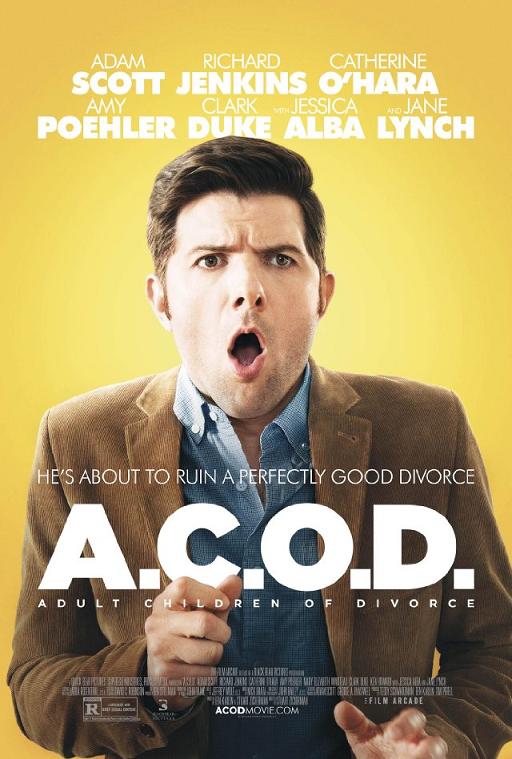 Maybe “the right leading man” is more accurate; A.C.O.D. lets much of its success ride on Scott’s narrow shoulders and nice guy charm. In fact, Scott’s very presence gives the film a built-in audience, comprised almost solely of the “people who follow Scott’s work on shows like NBC’s Parks and Recreation or Adult Swim’s woefully defunct Party Down” demographic. Typically, Scott plays the role of straight man in every ensemble he comes to join, making up one part of the whole, doing his job alongside people who as a rule take up more of the spotlight than he does; here, he’s front and center, and whatever failings can be hung on A.C.O.D., the picture gives him the chance to strut his stuff as the principal character, and he doesn’t spurn the opportunity. Studios, take notes.
Maybe “the right leading man” is more accurate; A.C.O.D. lets much of its success ride on Scott’s narrow shoulders and nice guy charm. In fact, Scott’s very presence gives the film a built-in audience, comprised almost solely of the “people who follow Scott’s work on shows like NBC’s Parks and Recreation or Adult Swim’s woefully defunct Party Down” demographic. Typically, Scott plays the role of straight man in every ensemble he comes to join, making up one part of the whole, doing his job alongside people who as a rule take up more of the spotlight than he does; here, he’s front and center, and whatever failings can be hung on A.C.O.D., the picture gives him the chance to strut his stuff as the principal character, and he doesn’t spurn the opportunity. Studios, take notes.
Scott stars as Carter, a generic thirty something restauranteur living in a generic small town who happens to be the less-generic (but more generic than you’d expect) product of a failed marriage, which is putting it lightly. His only defining qualities seem to be that he looks, talks, and acts like Adam Scott, all fine qualities in any sort of man; amazingly, they somehow render Carter mildly unlikeable, but that’s part of the point. For him, everything ties back to his parents’ volcanic matrimony – a union that’s more akin to the Hindenburg or Chernobyl than anything else – though he refuses to admit it even as they tromp back into his life following the surprise engagement of his little brother, Trey (Clark Duke).
Carter dedicates himself toward running interference, shielding Trey from the bottomless, wrathful contempt their mother, Melissa (Catherine O’Hara), and their father Hugh, (Richard Jenkins) have for one another. Twenty years after splitting, they’re both remarried, she to the loveable Gary (Ken Howard, a guy who was put on this planet for hugs), and he to Sondra (Scott’s Parks and Recreation paramour and all-around funny lady Amy Poehler); there’s a fragile peace in place, but only so long as they don’t share space in the same room. It’s a pretty basic set-up for embarrassing comic beats and last-act payoffs, but, strangely, A.C.O.D. – an acronym for “adult children of divorce” – never actually goes there.
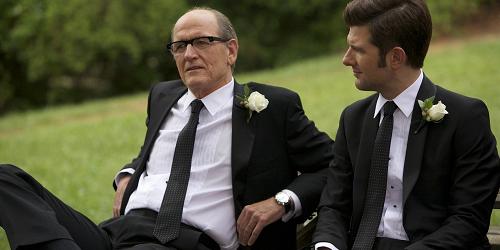
Maybe that’s because A.C.O.D. is a film about personal experience. Zicherman uses his own parents’ split as the basis for his narrative, something he’s openly discussed while doing festival and press circuits; at times, the movie naerly waxes nostalgic about the strife that comes packaged with a brutal, knockdown, drag-out separation, though that may well be because we spend so little time seeing Melissa and Hugh gnawing at each others throats. All of the childhood “stuff” that defines who Carter gets glossed over and stays more or less off the screen. Instead, we just get to see what the impact of that upbringing has had on him.
The other major detail at work here is practically ancillary to the conflict between Melissa and Hugh, or it would be in a totally different movie: turns out that at the age of 9, Carter was the unknowing subject of a study on children of divorce headed by Dr. Judith (Lynch), who wants to churn out a sequel to her work in the present by following up with her now grown up test kids. In truth, this little development actually drives the entire film by forcing Carter to deal with his deep-rooted maladjustment, but it feels like a superfluous layer in a yarn about holding it together when your folks refuse to be civil well into your adulthood. That’s enough of a dramatic fount without any needless tinkering.
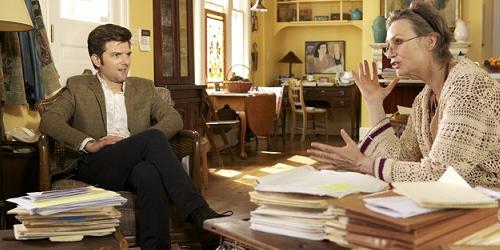
For a script this tight, there’s a remarkable amount of waste strewn throughout otherwise economical writing. (Seriously, Jessica Alba, playing one of the other A.C.O.D.s, could be cut from the film without affecting a thing.) Fortunately, performance offsets A.C.O.D.‘s missteps; if it’s not abundantly clear by now, then let it be said once again that Zicherman did a swell job with his casting. Scott avails himself well, even if he’s almost always in danger of being upstaged by O’Hara, Jenkins, and Lynch whenever he has a scene with them. That’s less a burn on Scott than a laurel for the veteran trio, all of whom know how to communicate volumes with the curl of a lip or the twitch of an eyebrow. The rest have comparatively little to do, but they make the most of what they get (though everyone shipping Carter and Sondra in advance should put their fanfic away, because Poehler and Scott barely get to interact meaningfully); only Mary Elizabeth Winstead gets the short shrift as Carter’s loyal but functionless girlfriend.
G-S-T Ruling:
But what’s really missing here is a sense of craft. Zicherman has spent most of his career writing and producing; A.C.O.D. represents his first directing credit, and while he this attempt shouldn’t be his last, he could stand to do a little homework before his next foray into feature filmmaking. This is a movie that’s as common in aesthetic as in character, and which benefits more from shrewd hiring choices than storytelling skill. That’s okay, of course, but it’s a poor formula for cobbling together a movie – no matter how well-versed its players are in the art of comedy.
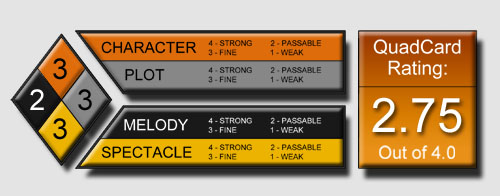
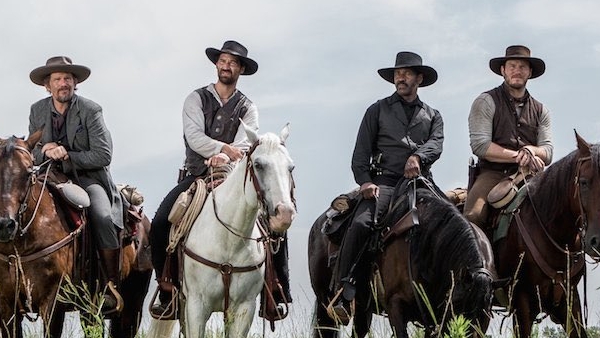

2 Comments
Colin Biggs
I keep hoping for Scott to break out in something other than the excellent Parks and Rec, but it doesn’t seem to happen for him.
It seems like that could be said for Alba in just about anything she is in.
Andrew Crump
This is decent stuff, just undercooked and unfocused, but if it ends up doing anything positive for Scott’s career, then I’ll chalk it up to a win.
Honestly, I think they could have cut Alba’s character out of the film entirely without missing a beat,